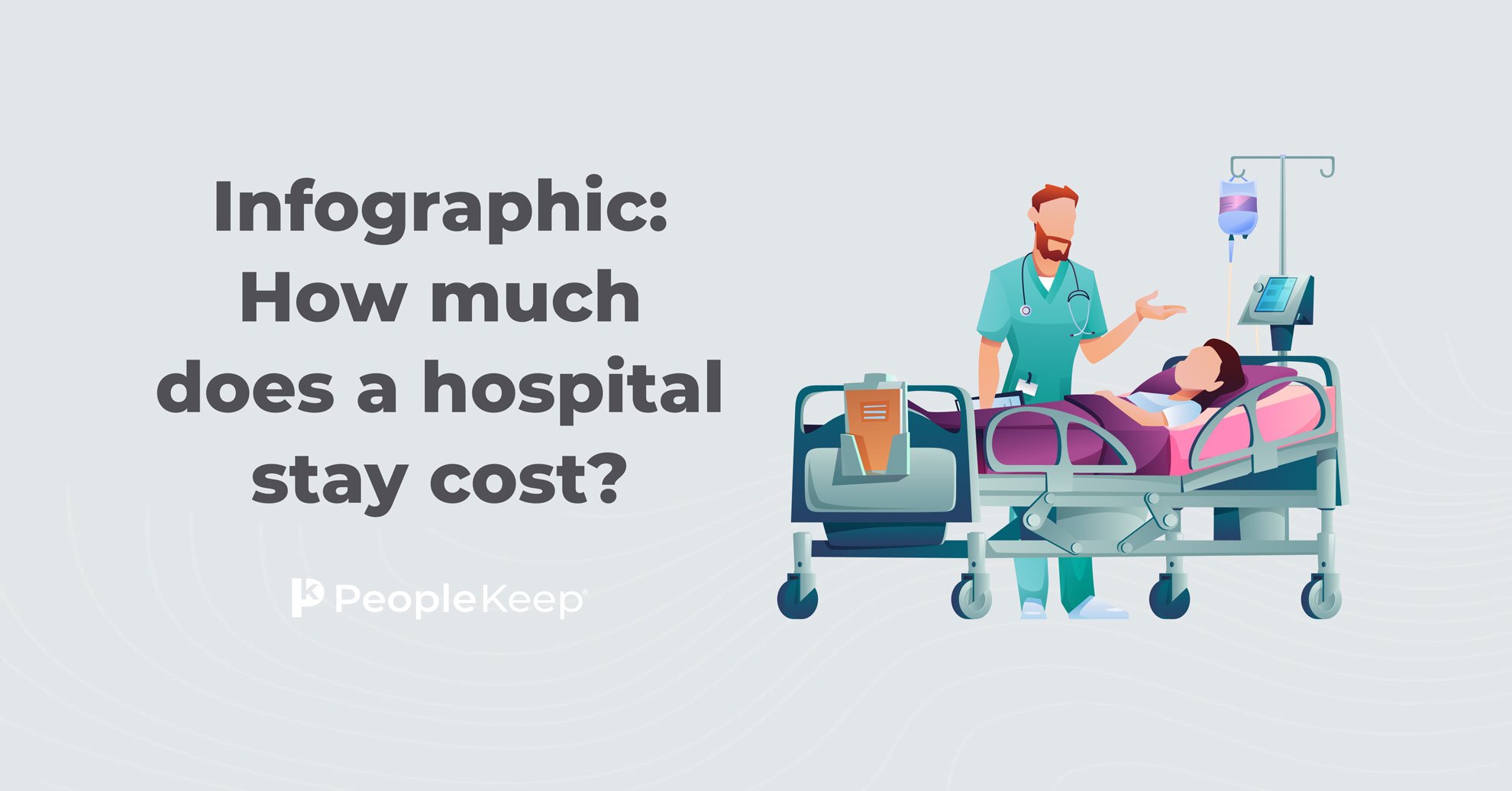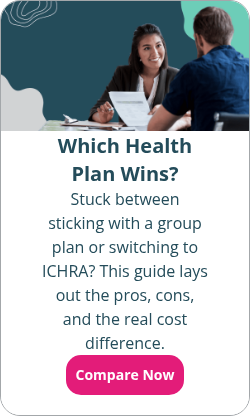Can I offer a health insurance stipend?
By Holly Bengfort on February 12, 2026 at 12:00 PM
For many small and medium-sized businesses (SMBs), offering a traditional group health plan is an expense they can't afford. Luckily, there are more affordable and flexible options that make offering health coverage possible.
Some employers can provide workers with a health stipend to help pay the cost of an employee's individual health insurance premiums and other medical expenses. However, depending on the size of your organization, it may not comply with federal legislation.
In this article, we’ll explain how healthcare stipends work. We'll also introduce another affordable alternative to traditional group health plans that many SMBs find more practical.
In this blog post, you'll learn:
- How stipends can help employees with their healthcare expenses.
- How health reimbursement arrangements (HRAs) work.
- How healthcare stipends compare to HRAs as alternatives to group health plans.
What is a health stipend?
One way SMBs can help workers cover the cost of health insurance plans and other out-of-pocket healthcare expenses is to offer an employee stipend, which is simply extra money in a paycheck.
A health insurance stipend is typically a flat monthly, quarterly, or annual amount given to employees, which they can spend at their discretion. While employers can encourage employees to use the stipend for health insurance, they can't require it. They also can't ask employees to provide proof of purchase for items or services listed in IRS Publication 5021. Employers also can't request proof of payment for a health insurance policy. Otherwise, the federal government might consider a stipend as an employer payment plan (EPP), which violates the rules in IRS Notice 2013-542.
Both employers and employees need to understand the tax implications of healthcare stipends:
- The healthcare stipend is taxable income to the employee.
- Employers pay payroll taxes on the healthcare stipend.
- Your employees can generally use a healthcare stipend alongside premium tax credits for Marketplace coverage. But, because it counts as taxable income, it can increase an employee’s modified adjusted gross income3 (MAGI). This can reduce or even eliminate the federal subsidies they qualify for under the Affordable Care Act (ACA).
Despite these considerations, healthcare stipends can still be a highly attractive benefit, offering employees flexibility and personalization in choosing how to spend the funds on eligible medical expenses.
Who is a healthcare stipend good for?
While health insurance stipends carry additional taxes compared to HRAs, they can be a good option for organizations with many employees who qualify for premium tax credits.
With premium tax credits, also known as health insurance premium subsidies, individuals can receive a discount on their individual health insurance plans. However, if the employee is offered an HRA, they may have to either reduce their tax credit by the allowance amount or opt out of the HRA to participate.
With a stipend, employees can participate in their employer's benefit offering and collect their full premium tax credit. Stipends are also a good option for employers who don't want to deal with the administrative burden and compliance considerations that come with traditional group health insurance plans.
If you want to offer a health benefit to your 1099 contractors or international workers to promote retention, a stipend can help.
Taxable healthcare stipends are also an excellent option for organizations that want to offer an allowance for health benefits that HRAs and traditional group health insurance don't always cover.
However, while any organization can offer a healthcare stipend, only those with fewer than 50 full-time equivalent employees (FTEs) can do so instead of health insurance or an HRA. This is because a stipend doesn't satisfy the Affordable Care Act's (ACA) employer mandate, which requires organizations with 50 or more FTEs to offer affordable health insurance to their employees.
If your organization has 50 or more FTEs, or you're looking to offer a tax-free alternative to a stipend, an HRA is your best option.
A stipend also won’t work for organizations that want to ensure their employees enroll in health coverage. Because you can’t legally require your employees to use their stipend on premiums, there’s no guarantee that they’re using the funds on health coverage.
What is a health reimbursement arrangement (HRA)?
Another alternative to group health insurance is a health reimbursement arrangement (HRA). Healthcare stipends may be straightforward to set up, but the fact that they're a taxable benefit can be a downside for many employers. This is why many employers opt for the tax benefits that come with an HRA. Through an HRA, employers can reimburse employees for health insurance premiums and qualifying medical expenses. Employees can only use employer contributions on qualifying forms of insurance and out-of-pocket costs as determined in the plan’s design.
What type of HRA is best for your organization?
Several types of HRAs can work for organizations of all sizes, depending on your goals and workforce.
The most popular HRAs include:
- The individual coverage HRA (ICHRA): Employers of any size can offer an ICHRA. It allows for additional customization with employee classes. For example, you can provide a traditional group plan to some employees while giving an HRA allowance to others. ICHRAs can also help applicable large employers (ALEs) meet federal requirements, including the employer mandate. Employees need individual health insurance coverage to participate in the ICHRA.
- The qualified small employer HRA (QSEHRA): Only small businesses with fewer than 50 full-time equivalent employees (FTEs) can offer a QSEHRA. Unlike the ICHRA, employees only need plans that provide minimum essential coverage (MEC) to participate in the QSEHRA. They can be on a parent's or spouse’s group health plan and qualify.
- The group coverage HRA (GCHRA): The GCHRA works alongside traditional group health plan coverage. This is a good option for employers with a high deductible health plan (HDHP) who are looking to help cover the out-of-pocket medical expenses that aren't fully paid for by the group plan.
With the right HRA, you can offer meaningful health benefits while controlling costs and keeping administration simple.
Conclusion
You don't have to get stuck with rising healthcare costs. There are more cost-effective healthcare options than traditional group health insurance coverage.
Small or medium-sized business owners have the option to choose between a taxable health insurance stipend or a health reimbursement arrangement (HRA), providing them with affordable, flexible, and tax-free health benefits.
PeopleKeep by Remodel Health helps thousands of organizations offer personalized health benefits with ease. With our HRA administration software, you can set up and manage your benefit in just minutes each month. We’ve helped thousands of small employers switch from offering no benefits or stipends to a compliant HRA.
This blog article was originally published on October 21, 2013. It was last updated on February 12, 2026.
Check out more resources
See these related articles

Infographic: How much does a hospital stay cost?
How much does an ER visit or hospital stay really cost? This infographic breaks down average expenses and highlights why having the right coverage matters.

Offering stipends vs. salary increases
Employees increasingly desire added benefits and perks over yearly wage increases. But, what's the difference between stipends and salary increases?

Five tips to start offering employees health benefits
Learn five essential tips for offering health plans for employees. Discover how to choose the right benefits to attract and retain top talent.




